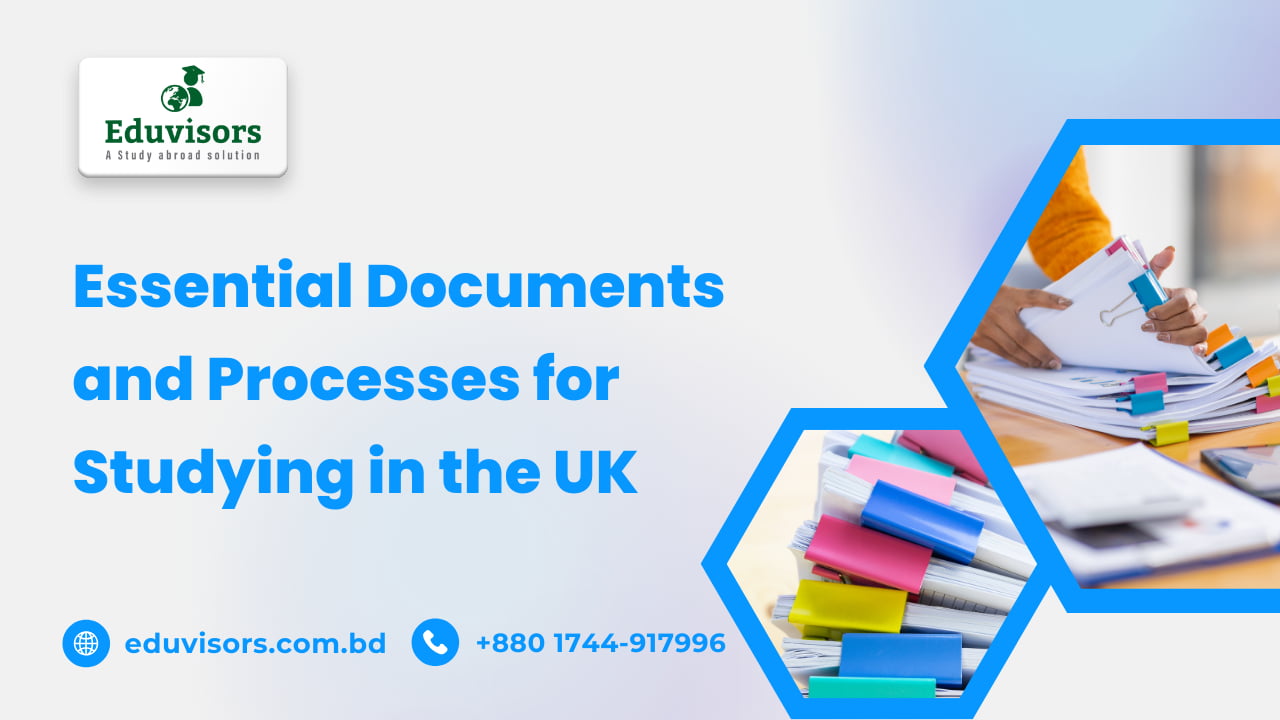The United Kingdom (UK), home to more than 150 higher education institutions, including some of the most prestigious and well-regarded universities globally, draws a wide range of international students worldwide each semester.
Due to strict standards, numerous documents, background checks, interviews, variable processing timeframes, shifting immigration laws, language obstacles, and the requirement to prove financial stability, obtaining a student visa can be a complex and lengthy procedure. Due to this complexity, many students may abandon their desire to study abroad.
You can access a top-notch education in the UK with the help of Eduvisors. You’ll get individualized help at every stage of the application process, with specialized support and access to a vast network of UK universities.
Make well-informed decisions regarding your academic future while navigating the problematic admissions and immigration procedures with ease. Your reliable guide to a successful UK educational path is Eduvisors.
This Article Includes
ToggleImportance of Confirmation of Acceptance Studies (CAS)
To apply for a student visa, you must have a Confirmation of Acceptance for Studies (CAS) letter and essential documentation for UK immigration officials. The CAS proves that you are a legitimate visitor to the nation and validates your acceptance as a student by a recognized educational institution.
The letter will provide important information regarding your selected course, such as start and end dates, and confirm that you have met all admission requirements.
Your first step is to accept an offer from a UK university and pay any necessary deposits to obtain a CAS letter. Upon meeting these requirements, the university will create and email the CAS letter to you online. You must carefully review the material in the letter to ensure it is correct and fits your expected study schedules.
Differential Evidence Requirement
When applying for entrance clearance in a nation or place of regular residence, as well as for permission to stay in the UK, some applicants for student visas are exempt from having to submit proof of their financial situation. It is known as the “differential evidence requirement” by the Home Office. Submitting the evidence’s credentials and finances with your application is unnecessary if you can apply under the differential evidence arrangement. Unless you have been residing in the UK with authorization (of any visa) for 12 months or more on the date you apply for the visa. You are making your visa application in the UK; the UKVI may seek this documentation while your application is being reviewed.
In any event, you should not be required to submit proof of qualifications if you are enrolled in a degree-level program. Suppose you are applying for a visa to study for a pre-sessional course or the International Foundation Program. In that case, you should be prepared to provide documentation of your qualifications as mentioned on CAS upon request.
Detailed Overview of Necessary Documents
Evidence and documentation are significant when applying for a UK visa. They act as verifiable evidence of your eligibility, good intentions, and capacity to adhere to the conditions of the visa. These supporting documents will be crucial in helping UK immigration officials decide how to proceed with your application. They will evaluate the accuracy of your claims and ascertain whether you fit the requirements for entry into or an extension of stay or settlement in the UK by closely examining your documentation and supporting documentation.
- Passport or Travel Document: The passport or equivalent travel document is the primary identification and validates the individual’s nationality. It should remain valid for the intended stay in the UK and have adequate blank pages for visa endorsements, meeting the UK’s validity requirements.
- Biometric Residence Permit (BRP): The Biometric Residence Permit (BRP) is a secure identification card containing the individual’s biometric details and immigration status. If the individual already resides in the UK with a visa, the BRP is proof of their right to stay and work there, which is essential for visa extension or settlement applications.
- Tuberculosis Test Certificate Requirement: Depending on the country of origin, the individual might need to undergo a tuberculosis (TB) test and obtain a certificate confirming their test results. This certificate demonstrates that they have been screened for TB, ensuring they can enter the UK without posing a public health risk.
- Previous Sponsor Consent: In cases where the individual has been sponsored previously for a UK visa, particularly under specific categories like work or family visas, obtaining consent from the previous sponsor may be necessary. This consent confirms that the individual is no longer under their sponsorship and can apply for a new visa or extension independently.
Age-Specific Documentation: Parental Consent for Under 18
- Written approval from parents or legal guardians is required if you are under eighteen (or from just one parent if they are the only ones responsible).
- It needs to cover their approval of your visa application.
- Your living and care plans in the United Kingdom
- Your journey to the United Kingdom
- A copy of your birth certificate or similar official government document with your parents’ names will also be required.
Academic Qualification Documents
Some important documents are needed to ensure admission. These are written below:
Documents Required for Undergraduate Courses
Following is the list of documents required for UG courses to be studied in the UK:
- Academic Transcripts for English language tests taken in 10th and 12th grade
- English language test score: IELTS Academic, TOEFL iBT, C1 Advanced, PTE Academic, or Duolingo
- Certificate of Medium of Instruction (in some cases, this certificate may be used instead of English test results)
- The results of other admission tests, such as the SAT, the LNAT Exam for law, the BioMedical Admissions Test (BMAT) for medical, biomedical, and dental programs, and the Mathematics Admissions Test (MAT) for bachelor’s degrees in sciences and engineering,
- A birth certificate
- The passport
- Letters of recommendation, if needed
- Copies of any appropriate diplomas or degrees
- Statement of purpose
- Resume or Curriculum Vitae (CV)
Documents Required for Postgraduate Courses
Following is the list of documents required for PG courses to be studied in the UK:
- Application form
- Academic Transcripts from 10th, 12th, and bachelor’s degrees
- English language test results; IELTS Academic; TOEFL iBT; C1 Advanced; PTE Academic; or Duolingo
- Certificate of Medium of Instruction (in a few cases, this certificate may be used in place of English test results)
- Additional test results for admittance, such as the Graduate Medical School Admissions Test (GAMSAT Exam), GMAT, and GRE,
- A birth certificate
- A valid passport
- Letters of recommendation, if necessary,
- Copies of any appropriate diplomas or degrees
- A statement of purpose
- Resume or Curriculum Vitae (CV)
- Any portfolio or research proposal (for particular courses)
Documents Required for Ph.D. Research
Following is the list of documents required for the Ph.D. program to be studied in the UK:
- It is necessary to have a 4-year bachelor’s (Hons) degree or a degree comparable to a master’s.
- A minimum of 7.0 is needed on the IELTS overall.
- A minimum of 60 is required on the PTE overall.
- A minimum of 90 is required on the TOEFL (iBT) overall.
- Essays for submission
- A proposal for your doctoral research
- scores on the GMAT and GRE
- Statement of purpose
- Student Visa for the UK
- Recommendation letter
List of Important Documents
Here are the details of the documents mentioned above that are required for study abroad:
Passport
To study overseas, all students must possess a valid passport. At the time of the visa application, the passport must have at least three years remaining.
Marksheets and Certificates of Graduation
Student copies of all required grade reports and pass certificates are also required. For instance, students pursuing master’s degrees must turn in their passing certificates, all semester grades, and grades from grades 10 and 12. For every application, a minimum of one (and occasionally two) sets of copies are needed. All copies need to be verified.
Letters of Recommendation (LOR)
One of the most essential papers needed for admission to study at UK universities is a letter of recommendation (LOR). One of your instructors or superiors must provide a letter of reference (LOR) reflecting your experience, accomplishments, and skills in the classroom or workplace. Students must submit a minimum of two recommendation letters.
Statement of Purpose (SOP)
A statement of purpose is one of the most crucial documents when applying to UK institutions. You can explain your goals for the future and why you want to study at the university in this statement. Universities use SOPs exclusively to get information about applicants, their goals, and how they may benefit the university.
Scores on the English Proficiency Test
International students must submit their IELTS, TOEFL, and, most recently, Duolingo test results as part of the application process. UK institutions only offer English-language courses, and applicants must demonstrate their fluency in the language to study there. These grades are regarded as one of the most crucial prerequisites for enrollment at institutions in the United Kingdom.
Participation Certificates and Work Experience Letters
When applying for admission, students may also send in certificates of participation from extracurricular activities and reference letters from internships or part-time jobs. It could be necessary for certain applicants to perform arts courses to submit documentation of their involvement. Similarly, to be considered for specific master’s programs, applicants may need to submit documentation of their prior employment.
Curriculum Vitae/Resume
It will contain details about your objective, education, work experience, internships, and, if applicable, internships; milestone scores (annual and final aggregates); projects finished during your undergraduate program; internships and full-time jobs; and any mention of co-curricular and extracurricular activities.
Financial Documents: Demonstrating Your Capacity to Fund Your Studies
One of the most crucial documents for admission to UK universities is evidence of financial support for living and studying there. Students must submit bank statements with sufficient liquidity to cover living expenses for at least nine months and tuition fees for the first year of the study or the complete course fees if the course lasts less than a year.
Students may provide a bank account statement or a bank letter in their or their parent’s name. Scholarship recipients must give details on the scholarship or their student loans to demonstrate their financial eligibility. Proof of maintenance must prove that the money was held for at least 28 days straight, ending on the day your bank account shows the closing sum.
Self-funded Students
If you pay your own tuition and living expenses while studying in the UK, you are considered a self-funded student, along with your parents or legal guardian. To satisfy the financial requirements, you must provide proof of personal bank accounts maintained in your name, your parent’s or guardians’ name, or a joint account named after you. Evidence of bank accounts in the names of friends, businesses, or other relatives (brother, sister, uncle, etc.) cannot be submitted. The accounts must be in cash funds, meaning they must be current, savings, or deposit accounts with flexible balances that can be accessed instantly and without warning. We won’t accept accounts with stocks, bonds, shares, trust funds, or pensions.****
Sponsored Students
As a result, sponsors have obligations to uphold to guarantee immigration control. Providers must demonstrate that they can carry out these sponsor responsibilities to obtain and maintain a student sponsor license.
Duty
A sponsor has a duty to:
- Act truthfully in all its interactions with the home office. For instance, when a sponsor applies for a student sponsor license or assigns a CAS, it must reveal all pertinent facts and refrain from making misleading representations.
- Behave honorably as a trustworthy provider of education;
- Presume responsibility for all of its sponsored students for the duration of the sponsorship, including making every effort to confirm that potential students are legitimate learners who can abide by immigration laws,
Requirements for Students Using Parents’ Bank Account
If you use your parent(s) or legal guardian(s) bank statement, you will need to provide one of the following documents as proof of your relationship to them:
- Your birth certificate
- Your paternity certificate
- A court order designating your guardian or guardians.
A letter from your parent(s) or legal guardian(s) confirming that you consent to utilize their funds for your education is also required. This correspondence needs to verify the following:
- The connection you have with your parent(s) or guardian(s)
- They are okay with you using their funds to study in the UK.
Examples of Financial Documents
Bank Letters
To verify that you have the necessary funds, your bank can provide a letter rather than a bank statement. This letter, which cannot be dated more than 31 days before the date of your student visa application, must attest to the fact that the funds have been retained for a continuous 28-day period.
Bank letter example:
A bank letter ought to:
- Be on formal stationery or a digital document
- Be typewritten or printed, not handwritten.
- Include your name or the name(s) of your legal guardian(s) or parent(s).
- Add the account number there.
- Provide details about the bank, such as the financial institution’s name, logo, and contact information.
- Incorporate the total amount of money that is available.
- Cite the date as well.
Documents you can use as evidence
Using a bank statement as evidence
- Your bank statement’s date must not be more than 31 days before the date of your visa application. It must demonstrate that, within 28 days, you have had the necessary funds each day.
- The statements for each account you use must span the same 28-day period.
- The bank statement needs to display your name, The number on your account, and The name and logo of the bank.
Support is available for New Students in the UK
Government Student Support
All four UK countries offer government student support programs for undergraduate studies. The arrangements in each nation differ significantly, as do the kind and amount of financial assistance provided. The government of the UK country you often remain in—which may not be the same as the country you ultimately decide to study in—is where you apply for help. The competent authorities will determine your eligibility and then evaluate your and your family’s income to determine the support you are eligible for.
Wrapping Up
In pursuing studying in the UK, recognizing the significance of essential documents and processes is a pivotal precursor to a fulfilling academic expedition. Assembling the necessary paperwork, obtaining the appropriate visas, comprehending financial requisites, and familiarizing oneself with academic prerequisites form the bedrock of a seamless transition into UK academia.
Embracing the cultural milieu and availing oneself of support systems amplify the prospects of a well-rounded educational sojourn. By meticulously attending to these essential facets, students can unlock the door to a transformative and rewarding academic experience in the vibrant landscape of the United Kingdom.



